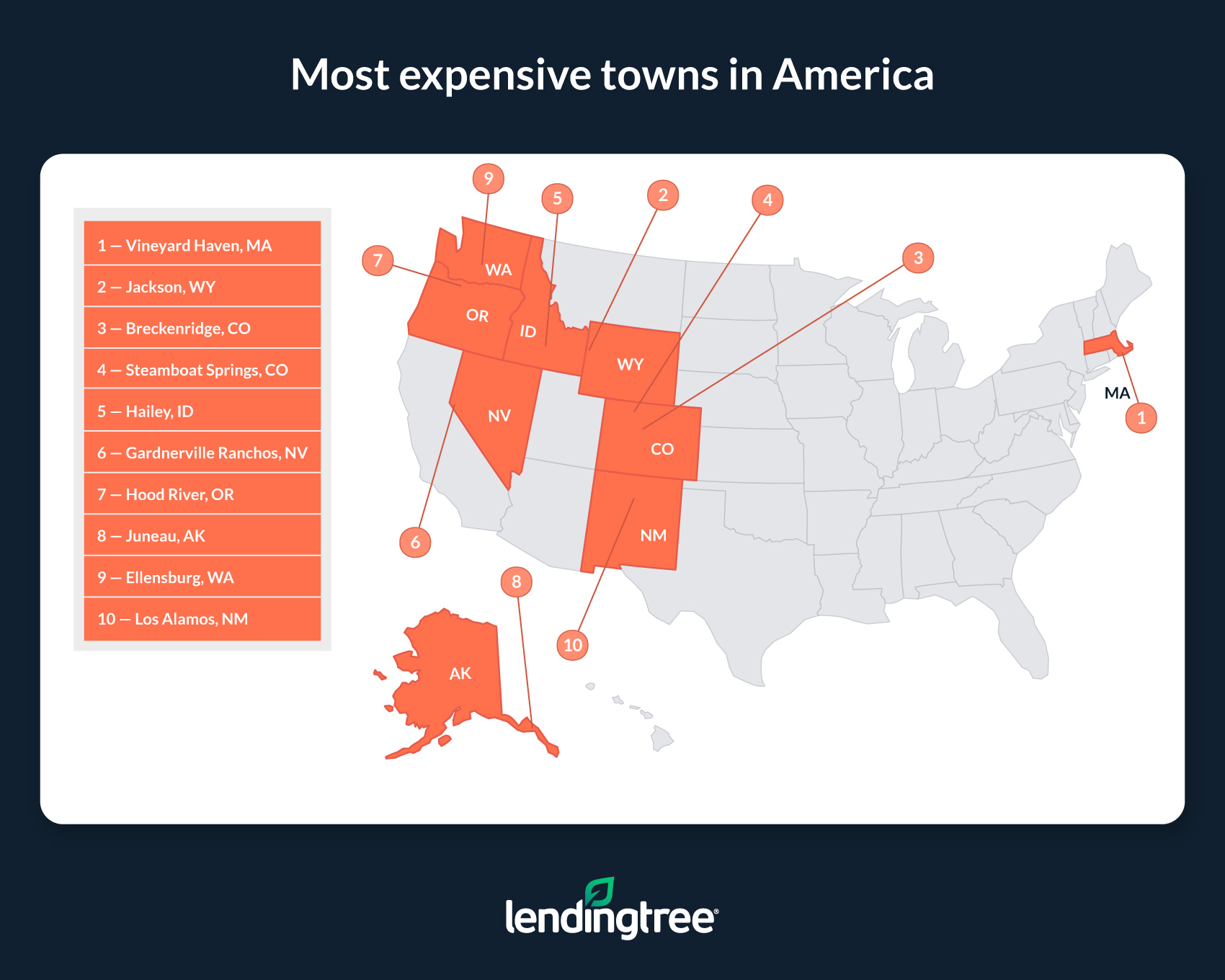 [1]Compared to big-city living, town-and-country lifestyles are often depicted as simple and inexpensive, especially when it comes to housing costs—but is that accurate?
[1]Compared to big-city living, town-and-country lifestyles are often depicted as simple and inexpensive, especially when it comes to housing costs—but is that accurate?
To look at how costly buying a house in a town can get, LendingTree analyzed U.S. Census Bureau American Community Survey data [2] to find the 50 U.S. micropolitan areas—referred to in this study as “towns”—with populations between 10,000 and 50,000 that had the most expensive median home values.
Many towns across the country are full of expensive real estate, with home values that rival and, in some cases, exceed those found in major metropolitan areas.
Key Findings:
- In raw dollars, Vineyard Haven, MA, Jackson, WY, and Breckenridge, CO, are the towns with the most expensive real estate in the U.S. The median home values in these towns are $857,600, $670,100 and $641,900, respectively. This means that a median-value home in Vineyard Haven is valued in the same ballpark as one in San Francisco ($933,300), and that median-value homes in Jackson and Breckenridge are worth about as much as those in Los Angeles ($671,700) and San Diego ($627,200).
- Relative to income, homes in Vineyard Haven, Jackson and Hailey, ID, are the most expensive. In these areas, median home values are an average of 8.57 times higher than the median area household incomes. This suggests that many full-time residents in these towns would have to stretch their budgets to buy a house.
- Of the towns analyzed, homes are the least expensive relative to income in Evanston, WY, Los Alamos, NM, and Rock Springs, WY. The median home value in these areas is an average of 2.72 times higher than the median area household income, which implies that homes in each town are relatively affordable. This is especially true in Los Alamos—even though the median home price there is higher than in most other towns, the median household income is more than $123,000 a year.

Top 10 Most Expensive U.S. Towns:
- Vineyard Haven, MA
- Jackson, WY
- Breckenridge, CO
- Steamboat Springs, CO
- Hailey, ID
- Gardnerville Ranchos, NV
- Hood River, OR
- Juneau, AK
- Ellensburg, WA
- Los Alamos, NM
Top 10 Least Expensive U.S. Towns:
- Spirit Lake, IA
- Susanville, CA
- Vernal, UT
- Riverton, WY
- La Grande, OR
- Craig, CO
- Brookings, SD
- Lewisburg, PA
- Evanston, WY
- Blackfoot, ID
Why are homes in some towns so expensive?
As LendingTree's study, there are many towns where home values are as expensive—if not more costly as those in the country’s largest metros. While this may seem counterintuitive at first glance, various reasons explain it.
The nation’s most expensive towns are often popular vacation spots for affluent individuals who might not make their money locally and can afford to spend significant sums on homes. These types of homebuyers can buy up a town’s limited housing supply and drive up home prices in doing so, making housing difficult to afford for locals who aren’t high-income earners.
Even in areas that aren’t prominent vacation spots, home prices can still be expensive, due to a lack of housing supply. Rural areas often see a significant lack of housing development because construction is prohibitively costly and often considered not profitable enough to be worthwhile for builders.
This means homebuyers in many towns have to compete for a relatively small number of homes, which puts upward pressure on prices.
To read the full report, including more data, charts, and methodology, click here [2].